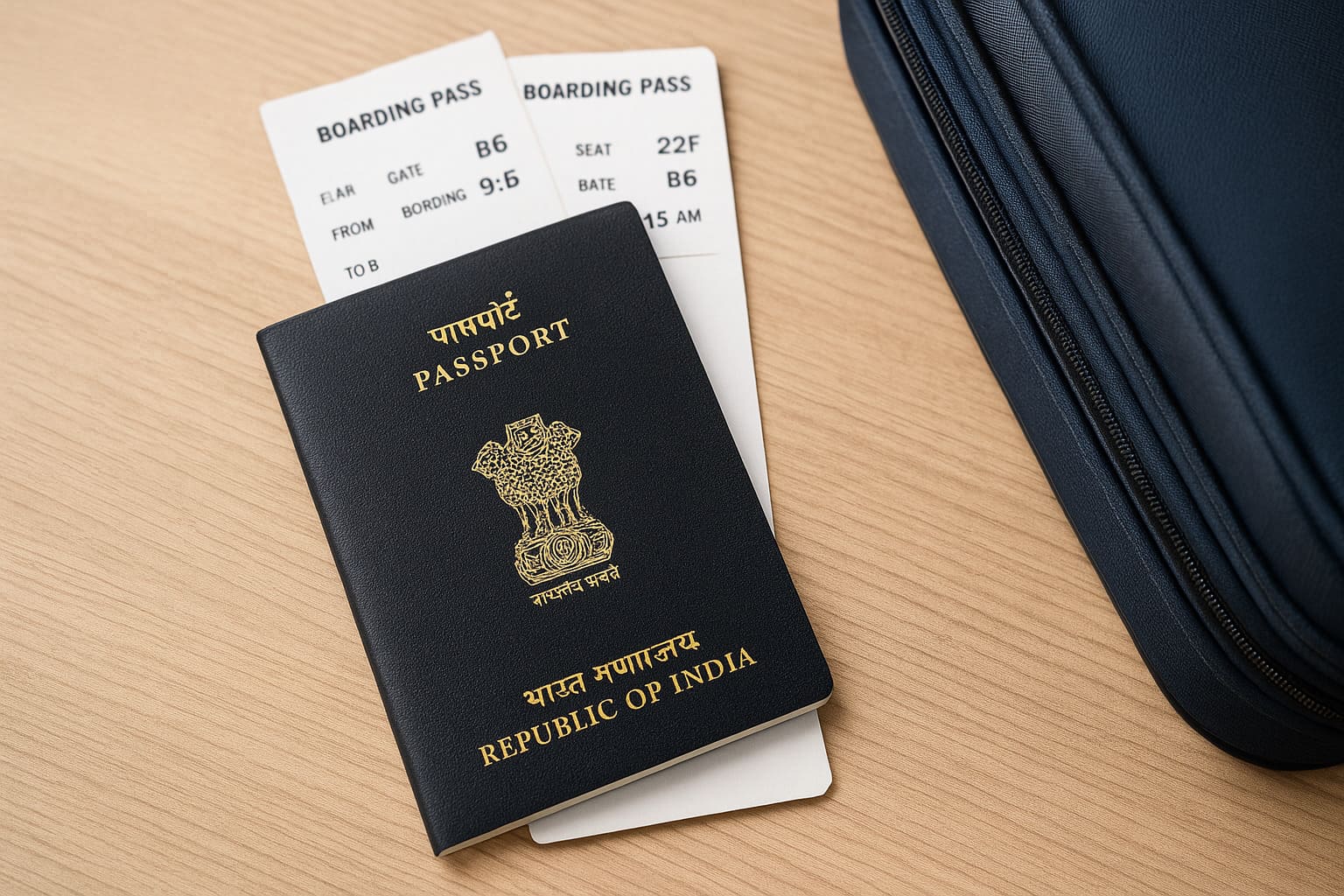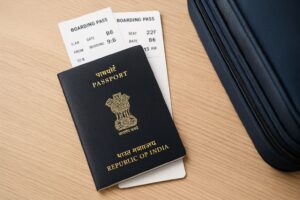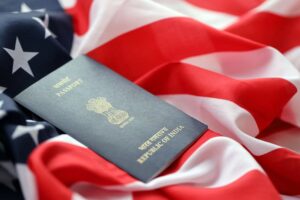
You do not need a passport to travel within India. If you are an Indian citizen flying between states, any valid government-issued photo ID is accepted at the airport. Aadhaar card, Voter ID, PAN card, or driving licence are enough for security and check-in.
Most domestic flights only ask for a basic identity check at the entry gate and boarding counter. CISF staff and airline crew match your face and ticket with the ID you show. Passport is not mandatory, but if you carry it, it is also accepted without question.
For bus, train, or private cab travel across states, ID checks are rare but you should still carry one photo ID. It keeps you safe and helps during hotel check-ins or police checks in sensitive zones.
If you are asking do we need passport to travel within India, you do not need one, but carrying at least one valid ID proof is useful.
Need Expert Help on Your Passport Application?
Our passport agents handle forms, documents, and just one call away..
Is passport needed to travel inside india
If you are wondering is passport required for domestic flights in India, the answer is no. Indian citizens can fly within the country using any valid government photo ID. You do not need a passport to board domestic flights.
The Ministry of Civil Aviation allows Aadhaar card, Voter ID, PAN card, driving licence, and a few other documents as accepted ID proof. These are listed officially and used by airline staff and airport entry counters.
At the airport, CISF personnel check your name on the ticket and match it with your photo ID. As long as the ID is original, clear, and matches your booking, you can travel without any problem. Aadhaar is the most common, but any of the listed IDs will work.
Carrying a passport is optional. Some travelers still carry it when other IDs are outdated, unclear, or have a mismatch in name or photo. If your Aadhaar has old details or your PAN card is worn out, a passport can be helpful.
For domestic flights, having one clean ID is enough. But make sure the name on your ticket and ID match. If there is any mismatch, even a valid ID can be rejected at boarding.
Valid ID proofs accepted while flying in india
Before a domestic flight in India, you need to show one photo ID that proves your name and identity. The name on your ticket must match the name on that ID. Many people ask what documents are accepted apart from a passport. The list below includes the most used and officially accepted ID proofs for domestic flights.
Aadhaar card
At most Indian airports, Aadhaar is the go-to ID. The staff at the gate scans the name, checks your photo, and lets you in. But this only works if your Aadhaar is updated. If the photo is old or the name has a spelling mismatch with your ticket, it can slow things down. Carry a backup ID if you are not sure.
Voter ID card
Voter ID is another government-issued document accepted at the airport. It shows your name, face, and voter details. However, old or worn-out cards can create confusion. Some cards have faded text or broken plastic covers. If your voter ID looks unclear, keep another ID in your bag.
PAN card
PAN is accepted, but it is not always smooth. Many PAN cards have short names or just initials. If your flight ticket has your full name, and the PAN shows something shorter, staff may not accept it without a second ID. Use PAN only if the name matches exactly.
Driving licence
This one is simple and strong. A clean driving licence with a photo and address is fully accepted. CISF guards and airline staff both approve it. It works well when you do not have Aadhaar or your PAN has name issues. Always carry the original, not a scanned copy.
Passport
You do not need a passport to fly within India, but if you carry one, it will be accepted without questions. It helps when other IDs are not clear or when the ticket name does not match your Aadhaar or voter ID. Some people just prefer using a passport because it avoids doubt.
Is passport required for train or bus travel
You do not need a passport to travel by train or bus inside India. If you are asking is passport required for train travel in India, the answer is no. Indian Railways and state-run buses do not ask for a passport during booking or boarding.
When you travel by train, you must carry any valid government photo ID. The ticket checker may ask to see it during the journey. Aadhaar card, Voter ID, driving licence, or PAN card are all accepted. The name on the ID should match the ticket. If you are showing a digital ticket, carry a physical ID to avoid confusion.
For bus travel within or across states, identity checks are rare. Most government and private buses do not ask for ID at all. But if you are crossing a state border or entering a restricted zone, police may ask for identification. An Aadhaar card is usually enough in these cases.
Carrying a passport is not required, but it can still help if your Aadhaar has issues or your name is mismatched on other documents. Some people prefer keeping it in their bag for long routes or emergency checks.
Do kids need a ID proof to fly in india
Children also need to show an ID proof while flying within India. If you are asking do kids need ID proof for domestic flights, the answer is yes. Airline staff and CISF guards must confirm the child’s name and age before boarding.
For infants and children below five years, a birth certificate is accepted. It should have the full name, date of birth, and parent details. This helps match the child to the booking. You must carry the original or a clear printed copy.
For kids between five and twelve, Aadhaar card is preferred. If the Aadhaar is not available, some airlines accept a birth certificate if it clearly matches the ticket. Always carry one document with the child’s name, photo, or date of birth.
No ID is accepted if it does not show the child’s full legal name. Nicknames or initials without proof can cause delay at the gate. Make sure the name on the document and the booking are the same.
A passport is not required for domestic flights, but if the child has one, it can be used. It is especially useful when no other ID is available or when travelling with only one parent.
When carrying a passport can be helpful
A passport is not mandatory for domestic travel, but in some cases, carrying one can prevent confusion or delays. It works as a strong, accepted identity document across states and can help when other IDs fall short.
Hotel check-ins in border areas
In towns near India’s border, some hotels ask for additional identity proof. Aadhaar or voter ID may not be enough if your address is from another state. A passport gives clear data with photo, address, and national proof in one place. It reduces the chances of denial during check-in, especially in regions like Kashmir, Arunachal, or parts of Sikkim.
Travel to places near India border
States like Mizoram, Manipur, Nagaland, and Arunachal often have extra checks at army posts or police gates. Even if you are an Indian citizen, having a passport helps avoid long questions. In restricted zones, carrying one ID that confirms everything in one glance is practical. This is not law, but it is real on ground.
Flight boarding ID mismatch issues
If the name on your flight ticket does not match exactly with Aadhaar or PAN, staff may stop you at the gate. This happens when initials, spelling, or date of birth is different. A passport has clean formatting and is accepted even when other IDs raise a flag. It helps complete check-in without extra delay.
Last-minute identity clarification
You may need to confirm your identity at unexpected places like a train station, a local checkpost, or hotel reception. In situations where your regular ID is unavailable or unreadable, a passport can help finish the process faster. It is one of the few documents that is accepted without question across India.
Places where you may be asked for passport in india
Some parts of India may ask for stronger ID proof than usual. It depends on local security, sensitive areas, or border zones. A passport is not required by law, but it may be requested on ground. Below are places where having one can avoid questions or delays.
Jammu and Kashmir
Hotels in Srinagar and areas close to Line of Control sometimes ask for more than Aadhaar. If you come from another state and your ID is unclear or half-faded, local police or hotel staff may ask to see a passport. It is rare, but it happens in regions under tight surveillance.
Northeastern states like Manipur or Mizoram
In towns like Aizawl or Imphal, army units at checkpoints may stop vehicles entering from outside. They usually ask for voter ID or Aadhaar. But if there is any mismatch in name or photo, they prefer to see a passport. It is not about travel rules — it is about quick trust in identity.
Defence-sensitive zones or army checkposts
In Ladakh, Sikkim, and border-facing roads in Himachal, identity checks happen without prior notice. Army staff posted on the route may do a spot check. They accept normal IDs, but if your documents are from another region or have poor clarity, they may ask for a passport. One document that confirms everything saves time.
Port entry zones in Andaman or Lakshadweep
Ship terminals and port gates in these islands sometimes follow different ID checking procedures. Visitors boarding ferries or entering isolated zones may be asked for stronger verification. If Aadhaar or PAN is not clear, passport works better. It confirms identity, age, and citizenship in one go.
Still Confused About the Process? Talk to a Passport Agent Today
Can passport be used as main ID in india
Yes, an Indian passport can be used as a primary ID across most places. It is one of the few documents that carries a full name, photo, date of birth, gender, and citizenship — all in one line.
At airports, the passport is accepted without question. It works well when your Aadhaar or voter ID has a mismatch in spelling or old photo. Hotel check-ins, train stations, and entry points in border zones also accept it as a strong ID.
Banks and telecom providers often ask for Aadhaar or PAN, but if those are not available or updated, a passport is usually accepted after basic verification. Some private offices, schools, and housing societies also treat it as reliable identity proof.
However, it helps most when your other IDs are unclear. A passport is not just a travel document — it holds value as a verified government-issued identity that cuts across states and departments.
If you carry one while travelling or checking into a new place, it usually avoids questions. But keep it safe. It is an original proof of citizenship and not something you want to lose on the road.
 Passport Guide
Passport Guide

